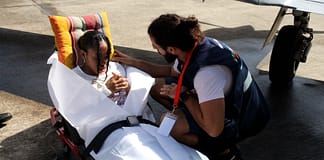
SOURCE: freshplaza- The second phase of the Antigua Black Pineapple revitalization project has been completed at the Cades Bay Agricultural Station in Antigua and Barbuda, with approximately 5,000 disease-free plants now in the ground.
This follows an initial planting of 5,000 plants two months earlier, totaling 10,000 tissue-cultured plants aimed at restoring the iconic fruit.
Craig Thomas, National Specialist for the Inter-American Institute for Cooperation on Agriculture (IICA), noted that the initiative addresses the declining population of the Antigua Black Pineapple.
“Over the years, Antigua Black Pineapple priority has been dying out, and so we saw it fit as an institution to support the Ministry of Agriculture, who requested the support,” Thomas stated.
The project is a collaborative effort involving IICA, the Ministry of Agriculture, the Caribbean Agricultural Research and Development Institute (CARDI), and St Vincent and the Grenadines’ tissue culture laboratory.
Thomas explained that approximately 50 suckers were collected from various farms in Antigua and Barbuda, sent to St Vincent for tissue culture propagation, with an expected total of 30,000 plants to be produced.
“Once we get those back, and we’re going to be getting those in batches, farmers will get an average of over 250 planting materials,” Thomas told Observer media.
The tissue culture process involves cleaning planting materials to eliminate viruses and diseases, recommended every three to four years for agricultural commodities.

“Once you clean it up by sending it to a lab where they will take the tissue from those plants, and they will generate a new plant from that same plant material, that plant is considered to be virus-free,” Thomas explained.
Brent Georges, Project Coordinator with the Ministry of Agriculture, emphasized the importance of this phase.
“This is a very crucial part of the project from the Ministry’s perspective because this is going to give us the planting materials that we’re going to be distributing to the farmers in the third phase,” Georges said.
He highlighted the need to maintain the Antigua Black Pineapple as part of the national coat of arms.
The project anticipates providing disease-free plants to local farmers by late 2025 or early 2026, with farmers included in the final phase.
Georges acknowledged the role of St Vincent and the Grenadines, stating, “St Vincent, and in particular the Ministry of Agriculture there, has been a friend in need.
Through the process of tissue culture propagation, we were able to clean it up and take out these diseases so that we got a true genotype of the Antigua Black Pineapple.”
Advertise with the mоѕt vіѕіtеd nеwѕ ѕіtе іn Antigua!
We offer fully customizable and flexible digital marketing packages.
Contact us at [email protected]
















The tissue culture project is a very visionary agro-industrial development project, and I am looking forward to the day, when the sweetest pineapple in the world, The Antigua Black Pineapple, in collaboration with the St Vincent and the Grenadines Tissue Culture Laboratory, shall cross breed the Costa Riican pineapple with the Antiguan Black Pineapple to create the sweetest and juiciest Pineapple in the whole world.
I remember my grandfather growing these — hope this brings that tradition back.
Just make sure they protect the farmers and don’t let this get commercialized for outsiders only.
My only question is — where exactly are they planting all 10,000?
Now this is the kind of agriculture news we need more of!
Nice!!!
That will never be our original organic black pineapple, CARDI will give us GMO in league with Monsanto and bill gates.
Comments are closed.